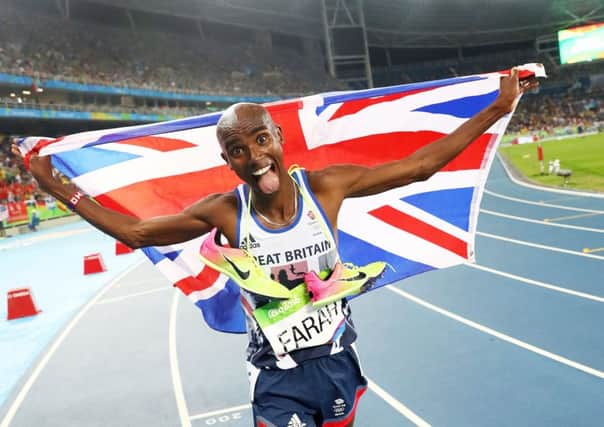Martyn McLaughlin: Giving Olympians gongs disservice to nation


When Alan Geldard secured his first and only Olympic medal for Team GB, his celebrations were characteristically modest. The 21-year-old cyclist marked his victory in the 1948 men’s team pursuit in London by wedding his childhood sweetheart, Enid, before the couple embarked on an extended honeymoon.
It was a period of deserved respite given Mr Geldard’s exertions in the weeks and months beforehand. With no sponsorship or endorsements available, the former Bevin Boy was forced to juggle his day job as a commercial artist with training sessions on the bike he had purchased with his own money, a rudimentary model with all the comfort its £5 price tag suggested.
Advertisement
Hide AdAdvertisement
Hide AdIf the young athlete held out hope that his bronze podium place might ease such ingratitude, he was to be disappointed. Upon his return to work, his employers expressed the view that the time he had taken off for his preparation, race and marriage could not be tolerated, and sacked him on the spot.
It is hard to conceive of a similar fate befalling Britain’s modern day team pursuit contingent. Having won gold in Rio, they are the bedrock of a gilded band returning home triumphant. Whereas once that journey might have been a deflating experience after the exhilarating highs of competition, it is now merely a stopgap in a cycle of adulation.
The 2016 team’s figurehead already has five gold medals, a CBE and a knighthood to his name, but Sir Bradley Wiggins can expect further acclaim. His teammates, Ed Clancy, Steven Burke and Owain Doull can muster two MBEs between them. Yet such is the clamour for our Olympians to be decorated with every bauble the British honours system has to offer, it would be imprudent to bet against the three of them following Sir Bradley’s lead.
Downing Street has confirmed that the scale and scope of Team GB’s Rio goldrush means there will be no formal cap on the number of athletes and coaches in line for honours come the New Year list, if not before. Although guidance is given by the Cabinet Office year to year on “ballpark figures,” the rewriting of the history books has swept convention away. The accumulation of 67 medals is, says Prime Minister Theresa May’s official spokeswoman, a “special circumstance”.
It is hard to decide which is more disingenuous – the rationale or the cynical sentiment which drives it. For the second successive Olympics, the government of the day has chosen to bask in reflected glory while appeasing an ill-conceived public baying for gongs for our Olympians.
It is only four years ago that the Commons Public Administration Select Committee criticised the flurry of honours bestowed on Team GB’s members after Beijing. Instead, it said, sporting nominations should take account not only of an athlete’s achievements, but also their length of service, contribution to the wider community and participation numbers in their chosen discipline.
Such considerations have long been kicked into the long grass in favour of automaticity and any suspicion of this fevered trend invites scorn. It is perceived as a slight against the athletes themselves, whose collective excellence and modesty is, it is worth restating, entirely deserving of praise. They return to these shores rightly feted, with the customary homecoming parade a welcome way of accommodating the spectacle of participatory congratulation that has become as integral a part of the British psyche as a culture of complaint.
The two phenomena are not mutually exclusive. Even those grand pageants are now insufficient. We are a nation dissatisfied with reverence. Only by conferring further accolades, no matter how tainted, can we adequately convey appreciation. The cycle of struggle and reward typified by televised talent contests, with all their painfully contrived narratives, now seems to inform how we as a country respond to success. We require gestures to articulate our gratitude.
Advertisement
Hide AdAdvertisement
Hide AdThe grand prize is admission to an honours system the vast majority of people believe should be overhauled or scrapped altogether, a carbuncle which, less than a month ago, was openly derided thanks to David Cameron’s valedictory act of cronyism. That sham has doubtless informed Prime Minister Theresa May’s generous attitude to our Olympians. Distributing an unprecedented booty of sporting honours is a means of not only playing to the gallery, but rehabilitating a discredited apparatus that holds up Samantha Cameron’s stylist as the apotheosis of public service.
A vocal minority have set out the case against this deluge, arguing that Britain’s athletes have already been recognised with their medals. Their point is not without merit. An Olympic gold, won in the white heat of elite competition, is more esteemed than a sovereign’s trinket. But nor should we blithely discount the meaning of an honour to someone like Mo Farah, the Somalia-born distance runner whose journey has given him a special understanding of national identity.
Wouldn’t it be refreshing, however, if one of our Olympians came forward to make the reasonable point that an honour will grant them no further recognition? If anyone is deserving of state-approved acclaim, it is those whose deeds predated the vogue for gongs for all.
Alan Geldard, still with us at the ripe old age of 89, would be one such deserving recipient. After 68 years, Ms May might not be in a position to give him his job back, but she could easily show that a degraded honours system retains some traces of substance.